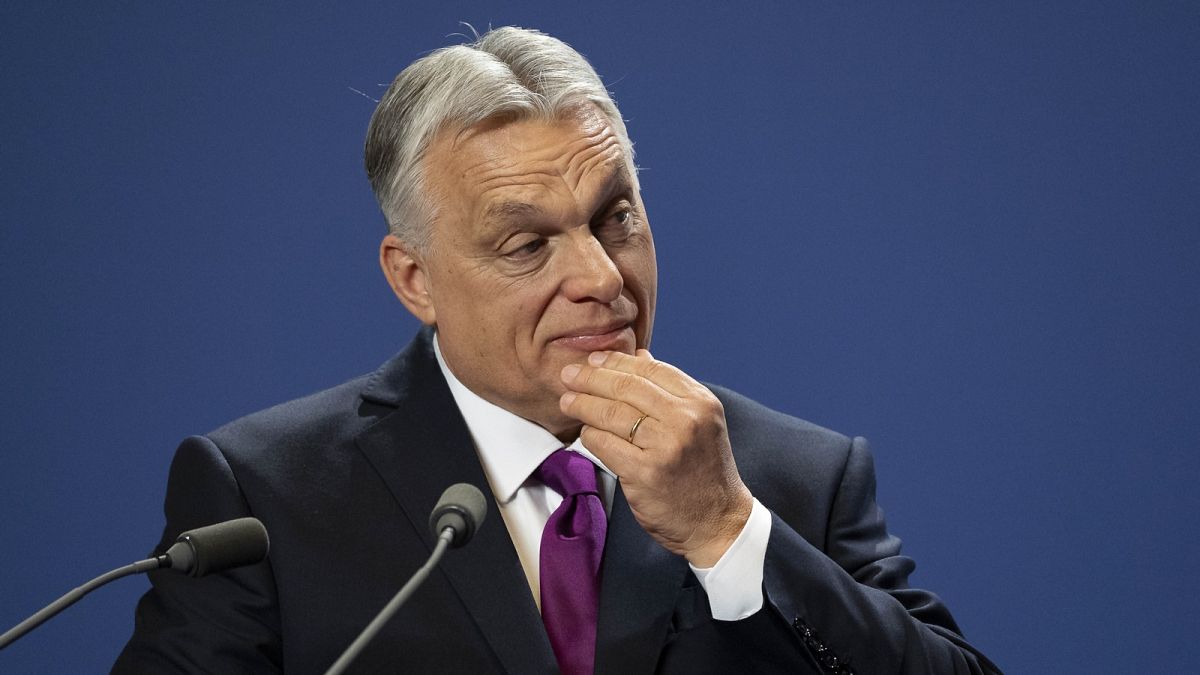The political backlash against Hungary’s new law banning the public celebration of Pride parades continues to intensify, with a growing number of countries coming forward to denounce the legislation as an attack against human rights and the right to assembly.
Belgium, the Netherlands and Luxembourg, the so-called BENELUX countries, issued a statement of condemnation read out during an informal meeting of equality ministers on Wednesday, several diplomats told Euronews.
“We are concerned about the laws passed in Hungary that undermine LGBTIQ+ rights and restrict the right to peaceful assembly and freedom of expression,” they said.
“Respecting and protecting the human rights and fundamental freedoms of all people, including LGBTIQ+ people, is inherent in being part of the European family. It is our responsibility and shared by the member states and the European institutions.”
Austria, the Czech Republic, Denmark, Estonia, Finland, Germany, Ireland, Lithuania, Portugal, Slovenia, Spain and Sweden supported the BENELUX statement.
France issued a “strongly worded” rebuke on its own, a diplomat indicated, while Greece and Cyprus spoke critically about “recent developments” across the bloc, using broad language that did not mention Hungary but was understood to be about the same issue.
The pushback comes after the Hungarian parliament passed an amendment to the constitution codifying the law that the ruling party fast-tracked in March. That law banned public events that are considered to be in breach of the Child Protection Act, which heavily restricted depictions of homosexuality and gender reassignment.
Events held by the LGBTQ+ community, such as the yearly Pride parade in Budapest that draws thousands of visitors, were prohibited under the new law.
The text will allow authorities to use facial recognition tools to identify people who organise and attend forbidden events, leading to fines of up to 200,000 Hungarian forints (€485). If not paid, the fines will be collected as taxes.
Additionally, the constitutional amendment approved on Monday declares that children’s rights take precedence over any other fundamental right (except the right to life) and recognises two sexes, male and female, which effectively denies transgender and intersex identities. The amendment also enables authorities to suspend, under certain circumstances, the dual citizenship of some Hungarian nationals.
Budapest vs Brussels
The sweeping changes fit in with Viktor Orbán’s agenda. The self-described “illiberal” prime minister has repeatedly attacked what he calls “woke ideology,” introducing legislation targeting the LGBTQ+ community, migrants and civil society.
“We’re protecting children’s development, affirming that a person is born either male or female, and standing firm against drugs and foreign interference,” he said after the vote in parliament. “In Hungary, common sense matters.”
Orbán’s contentious initiatives have deepened the chasm between Budapest and Brussels. Earlier this week, the European Commission voiced support for the LGBTQ+ community and said it would take legal action “if necessary” after examining the law.
“For the moment, we need to analyse the (constitutional) changes because it covers several topics and we need to look at them very carefully to be able to see from the perspective of European law,” a spokesperson said.
The spokesperson did not provide a timeline to initiate proceedings.
Besides possible breaches of fundamental rights, the Pride ban is also under scrutiny for its potential incompatibility with the Artificial Intelligence Act, which lays out strict limitations on how law enforcement can deploy facial recognition.
If a lawsuit were to happen, it would add to a string of open fronts.
The Child Protection Act, the 2021 law that underpins the Pride ban, is already the subject of a legal case before the European Court of Justice (ECJ) launched by the Commission in conjunction with 15 member states. (The list of supporting countries is almost identical to the one that backed the BENELUX statement in Warsaw.)
Separately, the Commission has sued Hungary over its controversial “National Sovereignty Law” and is deducting a daily €1 million fine imposed by the ECJ over an “unprecedented” failure to comply with EU migration and asylum rules.
The subtraction is applied to Hungary’s allocated share of the EU budget.
At the same time, Orbán’s adoption of Russian-friendly positions has antagonised both the Commission and the majority of member states. Last month, Orbán was the only leader who refused to endorse joint conclusions on Ukraine. This year alone, Hungary has threatened twice to block the renewal of sanctions against Russia, leading diplomats and officials to consider a Plan B in case the veto happens in late July.
Moreover, Hungary is the only country that opposes Ukraine’s membership bid, going as far as launching a public consultation on the matter. The billboards promoting the poll feature the face of European Commission President Ursula von der Leyen.
Read the full article here


